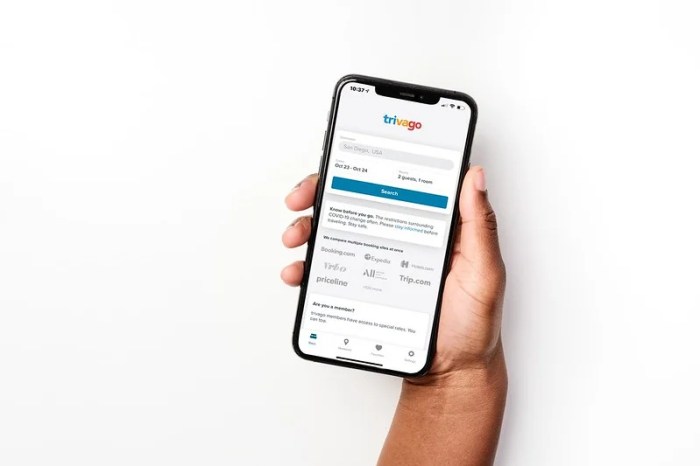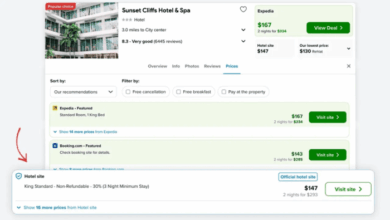Trivago hotels user reviews of customer service insights

Trivago hotels user reviews of customer service provide a critical lens through which the hospitality industry can be understood. As an essential hotel comparison platform, Trivago offers a vast array of accommodations, from luxury resorts to budget-friendly inns, catering to diverse traveler needs. Its user-friendly interface allows guests to seamlessly navigate through various options, making informed decisions based on comprehensive comparisons and genuine user feedback.
Customer service plays a pivotal role in shaping the reputation of hotels, influencing guest satisfaction and loyalty. In a competitive market, the ability of hotel staff to deliver exceptional service can mean the difference between a one-time visitor and a repeat customer. By examining user reviews, we uncover key elements that contribute to stellar customer service and highlight the impact these elements have on overall guest experiences.
Overview of Trivago Hotels: Trivago Hotels User Reviews Of Customer Service
Trivago serves as a comprehensive hotel comparison platform that streamlines the process of finding accommodations tailored to users’ preferences. With its robust functionality, it aggregates information from various booking sites, allowing travelers to compare prices and amenities effortlessly. This makes it a go-to resource for anyone seeking the best deal on hotels worldwide, whether for business or leisure travel.
The platform features a wide array of hotels and accommodations, ranging from luxurious five-star resorts to budget-friendly motels, bed and breakfasts, and vacation rentals. Users can find options that suit every budget and requirement, ensuring a diverse selection for all types of travelers. The inclusion of unique lodging such as boutique hotels and hostels also appeals to those seeking a more personalized experience.
User Interface and Navigation Experience
The user interface of Trivago is designed with simplicity and efficiency in mind, allowing users to navigate seamlessly through its extensive offerings. The homepage provides a straightforward search function where users can input their destination, check-in and check-out dates, and the number of guests. This initial step sets the stage for a tailored search experience.
Upon entering the search parameters, users are presented with a well-organized list of hotel options. Each listing includes essential details such as pricing, star ratings, user reviews, and a snapshot of amenities. An important feature is the filter option, which enables users to narrow down their choices based on specific criteria such as price range, hotel star rating, and guest ratings.
This structured approach enhances the decision-making process, allowing travelers to find accommodations that best meet their needs.
“The ease of comparing multiple hotel options on Trivago can significantly reduce the time spent planning a trip.”
Furthermore, the platform incorporates an interactive map that showcases the location of hotels relative to key attractions. This feature is invaluable for users looking to stay close to landmarks or specific neighborhoods. The mobile-responsive design ensures that users enjoy a consistent experience across devices, making it convenient to search for hotels on the go.
Overall, Trivago’s streamlined interface and user-centric navigation enhance the hotel booking experience, making it easier for travelers to make informed decisions and secure the right accommodations for their journey.
Importance of Customer Service in the Hospitality Industry

In the fiercely competitive landscape of the hospitality sector, customer service stands as a pivotal component that can significantly influence a hotel’s overall success. An exceptional customer service experience not only fosters positive interactions but also plays a crucial role in shaping a hotel’s reputation, directly impacting guest satisfaction and long-term loyalty. Understanding the intricacies of customer service allows hotels to leverage their strengths and address weaknesses effectively.The role of customer service in shaping a hotel’s reputation cannot be understated.
It serves as the first point of contact between the hotel and its guests, laying the groundwork for their experience. A warm welcome, attentive assistance, and swift resolution of issues can transform a simple stay into a memorable experience. Conversely, negative experiences can lead to detrimental reviews, which can quickly tarnish a hotel’s image. The advent of digital platforms has amplified this effect, making it essential for hotels to prioritize customer service.
Impact of Customer Service on Guest Satisfaction and Loyalty
Customer service is a critical determinant of guest satisfaction, which in turn influences loyalty. Guests who experience exemplary service are more likely to return and recommend the hotel to others. Positive customer service experiences can create emotional connections that encourage repeat visits. Evidence shows that 70% of consumers are willing to spend more with a company that provides excellent customer service, underscoring the monetary benefits of investing in this area.Factors contributing to guest satisfaction include:
- Personalized Attention: Tailoring services to meet individual guest preferences enhances their overall experience.
- Responsiveness: Quick and effective handling of requests or complaints fosters trust and satisfaction among guests.
- Consistency: Reliable service ensures that guests know what to expect, leading to increased comfort and loyalty.
The importance of fostering guest loyalty cannot be overstated. Loyal customers are not only more forgiving in case of minor service hiccups but also serve as brand ambassadors, promoting the hotel to their networks. This organic marketing can be invaluable in an industry where reputation is key.
Key Elements of Excellent Customer Service in Hotels
To achieve excellence in customer service, hotels must focus on several key elements that contribute to a seamless guest experience. These components create a foundation upon which lasting relationships can be built.Essential elements include:
- Staff Training: Ongoing training programs ensure that employees are knowledgeable, skilled, and equipped to handle various guest interactions.
- Empowerment: Providing staff with the autonomy to resolve issues can lead to quicker satisfaction for guests and a more positive work environment.
- Feedback Mechanisms: Regularly soliciting feedback allows hotels to continually refine their service and demonstrate their commitment to guest satisfaction.
A well-rounded approach to customer service not only enhances guest experiences but also establishes a positive work culture among staff, leading to reduced turnover and increased overall performance.
“Exceptional customer service is the lifeblood of the hospitality industry, leading to repeat business and positive word-of-mouth recommendations.”
User Reviews on Trivago
User reviews play a pivotal role in shaping the online reputation of hotels listed on Trivago. By aggregating feedback from various sources, Trivago presents a comprehensive view of customer experiences, helping potential guests make informed decisions. The aggregation process not only highlights positive reviews but also sheds light on areas where hotels can improve, thus fostering a culture of accountability and excellence in service.
The methodology behind the rating systems utilized on Trivago is designed to ensure fairness and transparency. Reviews are typically collected from various platforms, including direct hotel feedback, travel websites, and social media. Each review is weighted based on several factors, including the recency of the feedback and the credibility of the reviewer. This systematic approach to rating ensures that the displayed scores reflect the most accurate representation of customer satisfaction.
Common Themes in User Reviews of Customer Service
In analyzing user reviews on Trivago, certain recurring themes emerge that reflect customer sentiments about hotel services. These themes provide valuable insights into the strengths and weaknesses of various establishments. Below are common themes found in user reviews regarding customer service:
- Staff Attentiveness: Many guests express appreciation for staff members who are attentive, friendly, and willing to go the extra mile to meet their needs. Positive mentions often highlight specific individuals who made their stay memorable.
- Response Time: Timeliness in addressing guest requests or concerns is frequently discussed. Reviews often note when staff are prompt in responding to inquiries, which enhances the overall guest experience.
- Problem Resolution: Guests often share their experiences when issues arise, with positive reviews reflecting effective problem-solving skills of the hotel staff. A hotel that manages to turn a negative experience into a positive one often earns high praise.
“Exceptional service can transform a good stay into a great one, and guest reviews often highlight those pivotal moments.”
Reviews on Trivago not only provide insights into customer service but also serve as a catalyst for hotels to continuously improve their offerings. By paying attention to these themes, hotels can create better experiences that resonate with their guests and elevate their standing in a competitive market.
Analyzing Customer Service Reviews
In the hospitality industry, customer service can make or break a guest’s experience. Analyzing user reviews on platforms like Trivago reveals the essential criteria guests use to evaluate hotel customer service. Understanding these factors not only enhances guest satisfaction but ultimately drives repeat business and brand loyalty.To evaluate customer service in hotels, users often focus on several key criteria. These criteria guide their overall impression and decision-making process regarding their stay.
The criteria include the professionalism of staff, responsiveness to inquiries and complaints, the friendliness and approachability of employees, and the resolution of issues.
Criteria for Evaluating Customer Service
The assessment of customer service is multifaceted, with different attributes playing a significant role in guests’ experiences. The following factors are crucial in determining the quality of customer service:
- Staff Professionalism: Guests value staff who exhibit professionalism, such as maintaining a courteous demeanor and showing competence in their roles.
- Responsiveness: Quick and effective responses to inquiries or complaints are paramount. Guests appreciate when their concerns are addressed promptly.
- Friendliness: A warm and welcoming attitude from hotel staff creates a positive atmosphere and fosters guest satisfaction.
- Problem Resolution: The hotel’s ability to resolve issues to the guest’s satisfaction is often highlighted in reviews, with some guests noting how problems were managed effectively.
The comparative analysis of positive and negative reviews reveals stark differences in guest expectations and experiences. Positive reviews frequently emphasize the exceptional service provided, often citing specific staff members who went above and beyond. Such testimonials illustrate how personalized attention can leave lasting impressions. On the other hand, negative reviews typically point to unmet expectations, such as unresponsive staff or unresolved complaints.
Guests frequently express frustration when their concerns are not acknowledged or addressed adequately.
Importance of Responding to Customer Reviews, Trivago hotels user reviews of customer service
Engaging with customer reviews is vital for hotel management. It serves not only as a damage control mechanism but also as an opportunity for improvement. Management’s responsiveness to reviews—especially negative feedback—can significantly influence public perception. A well-articulated reply to a complaint can demonstrate a hotel’s commitment to guest satisfaction and accountability. This engagement often transforms a dissatisfied guest into a loyal advocate who appreciates the effort made to address their concerns.Additionally, addressing reviews publicly showcases transparency and builds trust with potential guests.
When prospective visitors see that hotel management is actively involved in resolving issues, they are more likely to feel confident in their choices.The significance of responding to reviews is further underscored by the potential impact on online reputation. In an era where online presence directly correlates with business success, maintaining a positive image through consistent engagement with customers is non-negotiable.
Effective management of customer service reviews can turn a hotel’s reputation around, enhancing both guest experiences and business outcomes.
Case Studies of Customer Service Experiences
Customer service plays a pivotal role in shaping guest experiences in the hospitality industry. By examining real-life case studies of hotels with varying levels of customer service, we can glean valuable insights into what actions lead to exceptional experiences and what pitfalls to avoid.
Outstanding Customer Service Case Study
The Grand Oak Hotel has consistently received praise for its exemplary customer service as reflected in numerous user reviews. Guests frequently highlight the hotel staff’s attentiveness and dedication to guest satisfaction. One notable instance involved a family celebrating a milestone anniversary. Upon their arrival, the staff had already prepared a surprise room upgrade, complete with personalized notes and complimentary treats to enhance their celebration.
This proactive measure deeply resonated with the guests, leading to a five-star review detailing their wonderful experience.
Key factors contributing to the Grand Oak’s acclaim include:
- Empathetic and attentive staff who anticipate guests’ needs.
- Consistent follow-up to ensure satisfaction during the stay.
- Personalization of services, making each guest feel valued.
These elements not only generate positive feedback but also foster a loyal customer base that returns time and again, reinforcing the importance of outstanding customer service in hospitality.
Poor Customer Service Case Study
In contrast, the Coastal View Inn has faced significant backlash due to inadequate customer service. Numerous reviews detail experiences of long wait times during check-in, unresponsive staff, and lack of basic amenities that were promised at booking. One guest recounted a frustrating incident where they reported a malfunctioning air conditioning unit, only to wait hours without any follow-up or resolution.
Such lapses resulted in a barrage of negative reviews, severely impacting the hotel’s reputation.
The shortcomings identified in the Coastal View Inn’s customer service include:
- Poor communication between staff and guests, leading to unmet expectations.
- A lack of proactive problem solving during service disruptions.
- Insufficient training for staff on customer interaction and support.
Lessons from this case emphasize the necessity for hotels to prioritize training and responsiveness, as failure to do so can tarnish their image and result in lost business.
Lessons Learned from Case Studies
Both case studies illustrate crucial lessons regarding customer service in the hospitality sector. Hotels should focus on cultivating a customer-centric culture that empowers employees to take initiative in satisfying guest needs. Additionally, consistent training and clear communication protocols are essential to address potential service issues before they escalate. By learning from both outstanding and poor service experiences, hotels can refine their practices, ultimately enhancing guest satisfaction and loyalty.
Trends in Customer Service Feedback
In the dynamic landscape of hospitality, customer service feedback is instrumental in shaping the guest experience. Recent trends among Trivago users highlight a significant evolution in expectations, reflecting the growing importance of personalized and prompt service. As travelers become more discerning, understanding these trends offers insights into the evolving nature of customer service within the hotel industry.The landscape of customer service feedback has shifted dramatically in recent years, driven by advancements in technology and changing consumer behaviors.
With an increasing reliance on online reviews, users are more vocal about their experiences than ever before. This shift has led to the emergence of specific trends that encapsulate the essence of customer service expectations.
Common Suggestions for Improving Hotel Customer Service
User reviews often contain valuable suggestions that can help hotels enhance their customer service practices. These insights stem from direct experiences and offer a roadmap for improvement. Some of the most frequently mentioned recommendations include:
- Enhanced Communication: Guests appreciate timely and clear communication, both prior to and during their stay. This includes prompt responses to inquiries and proactive updates on reservation changes.
- Personalized Experiences: Many users express a desire for hotels to tailor services to individual needs, suggesting that personalized greetings or bespoke recommendations can significantly enhance their overall experience.
- Staff Training: Feedback often emphasizes the importance of well-trained staff who are knowledgeable and equipped to handle various guest needs. Continuous training programs are suggested as a means to improve service quality.
- Streamlined Check-In and Check-Out Processes: Guests prefer efficient procedures that minimize wait times, highlighting the need for technology solutions like mobile check-in.
- Follow-Up Post-Stay: Users recommend that hotels engage with guests after their visit to gather feedback and foster loyalty, signaling that their opinions matter.
The evolving expectations of customers over time reveal a clear trend towards a more engaging and responsive hotel experience. Customers now prioritize not only the quality of accommodations but also the warmth and attentiveness of the service they receive.
“In today’s hospitality industry, the guest experience is as crucial as the amenities offered.”
Customer service expectations have evolved significantly, driven by a more informed and connected consumer base. Modern travelers expect immediacy and efficiency, often influenced by experiences in other sectors such as retail and online services. This shift underscores the need for hotels to adapt swiftly to these changing dynamics. As hotels strive to meet these heightened expectations, they must continuously monitor feedback and refine their service strategies.
This ongoing dialogue between guests and service providers is essential for fostering a culture of improvement and ensuring long-term success in the competitive hospitality arena.
Surveying Customer Service Satisfaction
In the competitive landscape of the hospitality industry, understanding customer service satisfaction is pivotal for hotel management. A systematic approach to surveying guests can yield invaluable insights, enabling hotels to align their services with guest expectations and enhance overall satisfaction. Regular feedback collection not only identifies strengths but also highlights areas that require improvement, fostering a culture of continuous enhancement.
Framework for Conducting Surveys
Creating an effective survey framework entails several key components that ensure comprehensive feedback from guests. The primary focus should be on clarity, relevance, and ease of completion. The following elements are essential in developing a robust survey structure:
- Define Objectives: Clearly Artikel the purpose of the survey, focusing on specific aspects of customer service that need evaluation, such as responsiveness, friendliness, or problem-solving abilities.
- Select Survey Method: Choose between online surveys, in-person questionnaires, or follow-up emails, ensuring the method is convenient for guests.
- Keep it Concise: Limit the survey to 10-15 questions to respect guests’ time while gathering essential insights.
- Utilize Rating Scales: Implement Likert scales (1-5 or 1-7) for quantitative analysis, allowing guests to express their level of satisfaction on various service aspects.
- Incorporate Open-Ended Questions: Allow guests to provide qualitative feedback, which can reveal nuanced insights not captured by quantitative measures.
- Test and Revise: Conduct a pilot test of the survey with a small group to identify any confusing elements and adjust accordingly.
Importance of Regular Feedback Collection
Regular feedback collection from guests is paramount in the hospitality sector. Consistent engagement fosters guest loyalty and demonstrates that the hotel values their opinions. This process not only helps in identifying trends over time but also in promptly addressing issues that may arise. By establishing routine feedback mechanisms, hotels can:
- Enhance Guest Experience: Immediate feedback allows hotels to rectify issues in real-time, preventing negative experiences from escalating.
- Build a Positive Reputation: Happy customers are likely to share their experiences online, positively influencing potential guests.
- Drive Employee Performance: Feedback can be utilized to reward outstanding staff or identify training needs, ensuring a consistently high level of service.
Implementing Changes Based on Customer Feedback
After collecting feedback, the next step is to implement changes that respond to guest needs and expectations. This process not only demonstrates responsiveness but also encourages future participation in surveys. Strategies for effective implementation include:
- Analyze Feedback Data: Use data analysis tools to identify prevalent themes or issues in customer feedback, focusing on areas that require immediate attention.
- Prioritize Changes: Rank issues based on their impact on guest experience and feasibility of implementation, ensuring that critical areas are addressed first.
- Communicate Changes: Inform guests about improvements made as a result of their feedback, fostering a sense of community and loyalty.
- Monitor Results: After implementing changes, continue to survey guests to assess the impact of those modifications on customer satisfaction.
Regularly surveying customer service satisfaction is not just a best practice; it is an essential element for thriving in the hospitality industry.
Recommendations for Hoteliers
The hospitality industry thrives on the ability to provide exceptional service that resonates with guests. In an age where online reviews can significantly influence a hotel’s reputation, it’s essential for hoteliers to focus on enhancing their customer service. This segment Artikels actionable strategies that can elevate guest experiences and foster lasting relationships, ultimately leading to improved satisfaction and loyalty.
Importance of Staff Training and Development
Investing in staff training and development is crucial for delivering excellent service. A well-trained staff not only possesses the necessary skills to respond to guest needs but also embodies the brand’s values, creating a consistent experience across all touchpoints. Effective training programs can focus on customer interaction, conflict resolution, and cultural sensitivity, ensuring that employees are equipped to handle diverse situations.
The following points highlight the importance of training:
- Empowered Employees: Training fosters confidence and capability, equipping staff to make decisions that enhance guest experiences.
- Increased Guest Satisfaction: Knowledgeable staff can provide timely and accurate information, leading to higher customer satisfaction scores.
- Reduced Employee Turnover: Investment in staff development can lead to higher job satisfaction and retention rates, reducing costs associated with high turnover.
- Brand Loyalty: Employees who are well-trained are more likely to advocate for the brand, enhancing the reputation of the hotel.
Leveraging Technology for Customer Service Enhancements
Technology plays a pivotal role in transforming guest experiences and streamlining service delivery. By adopting the right technological tools, hotels can enhance communication, improve service efficiency, and personalize guest interactions. Here are some key areas where technology can be effectively utilized:
- Mobile Apps: Custom hotel apps allow guests to manage their bookings, request services, and communicate with staff directly, creating a seamless experience.
- CRM Systems: Customer Relationship Management (CRM) systems help track guest preferences and past interactions, enabling personalized service tailored to individual needs.
- Chatbots: Implementing AI-driven chatbots can provide 24/7 assistance, answering common queries and reducing the workload on staff.
- Feedback Management Tools: Utilizing software to collect and analyze guest feedback in real time can help identify areas for improvement swiftly.
“Technology is not just a tool; it is a bridge that connects guests to an enhanced experience.”
Employing these technological advancements not only streamlines operations but also allows staff to focus on delivering a more personal touch, which is vital in the hospitality industry.
Concluding Remarks
In conclusion, Trivago hotels user reviews of customer service reveal not only the strengths and weaknesses of various establishments but also offer valuable insights for improvement. By analyzing feedback and understanding customer expectations, hoteliers can implement strategies that enhance service quality. As the landscape of hospitality continues to evolve, staying attuned to guest reviews and adapting to their needs will be essential for success in a rapidly changing environment.




